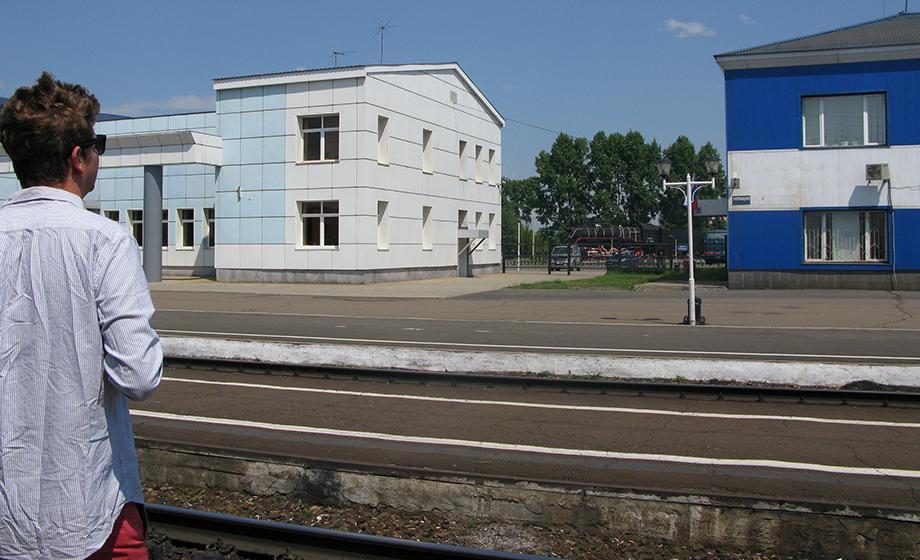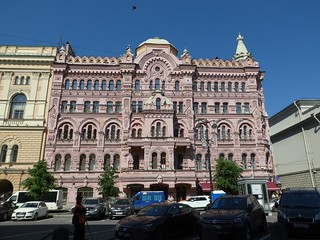Experiencing Russia, one mile and page at a time

When last we left Aviv Hilbig-Bokaer, dear reader, he was preparing to walk in the footsteps of famous Russian authors during a 17-day journey on the Trans-Siberian Railway. Since then, he’s taken blog readers to visit Russian literature’s important sites and experienced the country’s culture and complexities through the lens of literature.
This story is part of our 7 Continents, 1 Summer series, which highlights the interesting work that Clark students, faculty, alumni and staff are doing all over the world. Have a great story of your own to share? Let us know and we’ll be in touch.
“Although the Russia of today is a very different picture than the one depicted in the works of Tolstoy, Pushkin or Dostoyevsky, I was nonetheless struck by common themes that seemed to run through the years,” he says. “Despite all the changes Russia has been through, there was a striking familiarity in the ways in which people interacted and lived their lives, which I believe was accessible because of my interaction with the texts.”
Hilbig-Bokaer ’17 expected to read six books while on his LEEP project journey across the vast country. Instead, he read nine — for an approximate 3,000 page total over the course of the month — which he says was “surprisingly manageable.”
Among the sites he visited, one in particular — author Leo Tolstoy’s estate Yasnaya Polyana — stood out.
“I don’t consider myself to be a very outwardly emotional person, but as soon as I stepped onto the ground of Yasnaya Polyana I was struck with an overwhelming sense of joy that moved me to tears,” he writes. “It was my first time being in nature in many months and I found myself blown away by the beauty of the forests and meadows.”
He describes that experience in his blog:
“Yasnaya Polyana is essentially one giant estate, missing only its owners. The orchards and gardens are still cared for, the horses are still tied to the peach trees for mowing, and the houses are kept clean. Yet this all seems to be purely for the visitors’ delight and it felt far more genuine than Colonial Williamsburg. I wandered the orchards for a bit, having meaningful moments with some horses and read Tolstoy’s ‘The Cossacks’ in the tall grass. … I spent time by the ponds, walking through the wildflower meadows, and traversing the small ravines. By late afternoon I had stumbled upon a site which I considered avoiding: Tolstoy’s grave. It is a little unmarked green plot at the edge of the ravine and yet I knew exactly what I had come upon.”
Hilbig-Bokaer visited dozens of other sites as well, and noted how the country seemed to be filled with contradictions.
“I have never been to a country where the political history is so present in everyday life. While cities like Moscow and St. Petersburg have all the comforts of a western city, most other places I visited seemed to still be struggling with crumbling Soviet infrastructure and bureaucracy,” he says. “The train would pass by military bases which made it seem like you were in the richest country on earth, and then moments later pass through shantytowns of shacks built out of tin and old wood.”
He met many interesting people along the way, including a young family moving to Vladivostock from Moscow — the only others making the seven-day leg of the cross-country journey with him — and a group of high school students headed to Lake Baikal for a project.
“They (the students) all told me in broken English of their dream to one day come to ‘New York, the capital of the world,’ ” he said.
Hilbig-Bokaer discovered the “San Francisco of Russia” upon arriving in Vladivostock, which earned the nickname thanks to its position on a hill overlooking a foggy, rainy bay area. Located just 10 miles away from North Korea, the city has a sizable community of defectors.
He is continuing to work on his project, but feels his research, experience and reading have given him a fresh perspective on working with literature and allowed him to make an idea that was once as large as Russia itself manageable.
“This experience has given me such an incredible amount of insight into how I interact with literature and what it is about texts that I value,” he says. “Literature is such an important component to understanding cultures and building bridges between others and myself.
“As someone who plans to devote his life to scholarship, the research component of this experience was invaluable. I fanned the flame of lifelong learning which isn’t bound to go out anytime soon.”



